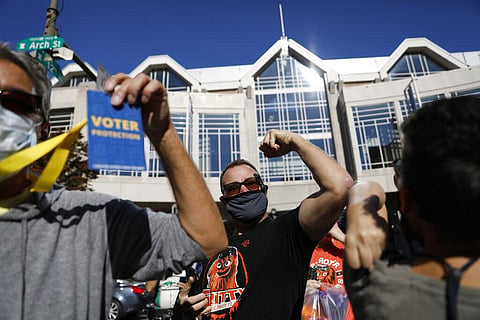

The hard-fought and bitterly disputed victory of former Vice President Joe Biden over President Donald Trump in the 2020 US election is not a closure of one chapter and the opening of a historic new one. Instead, it is a continuation of a long crisis of governance and cohesion that will constrain America’s capacity to lead the world.
The pandemic and the resultant economic distress were the prime factors that undid Trump’s re-election dream, especially by weaning away white working-class voters from him. Biden’s narrow wins in blue-collar bastions of Michigan, Wisconsin and Pennsylvania, which Trump had carried in 2016, are attributable to job losses and the dire public health conditions.
Trump’s sensational upset in 2016 was propelled by the widening class divide between have-nots and haves, which he spun into a narrative of ‘us’ common folks versus ‘them’ establishment elites. Biden’s recapture of some working class votes now does not mean the class conflict has been peacefully resolved. Income inequality in the US broke records under Trump’s watch, with a 50-year-high Gini coefficient of 48.5 in 2018. Biden’s vow to raise taxes on the super-rich appears to have appealed to some voters in Trump’s base, particularly the so-called ‘forgotten people’.
Apparently, they remained forgotten under Trump and some among them decided to utilise the agency they had of a ballot to give Biden a chance. Apart from class, race has always been a driver of American politics. It was no different in this election. Exit polls showed a whopping 87% of African-Americans voted for Biden, that too with a much higher turnout than in 2016. The pattern of Biden winning in suburban and big cities across the US owed in no small measure to the black vote. The extreme polarisation caused by Trump’s defence of ‘law and order’ and the police, amid the mass mobilisation of ‘Black Lives Matter’, proved costly for the incumbent.
Even Hispanics, the other big minority constituency, proved decisive in Arizona and Wisconsin in favour of Biden. Latinos were on Trump’s side in Florida due to the Cuba and Venezuela considerations, but they tipped the balance against him in other razor-thin margin states. The disproportionate burden of the coronavirus on people of colour in the US reflected in the anti-incumbency voting pattern. Yet, in spite of all the above-mentioned reasons for Trump’s loss, he managed to receive a popular vote of close to 48% to Biden’s 50%. More than 70 million people still voted for Trump, giving the President a foundation to cry foul about alleged ‘fraud’ and ‘cheating’ by Democrats through mail-in ballots.
Trump’s finger-pointing at the integrity of the electoral system will resonate with his die-hard followers for years to come. The cleavages of class and race that robbed Trump of a second term will be weaponised by right-wing populists to prevent any normalcy in the US. Since Biden failed to win in a landslide ‘blue wave’, and given the lingering shadow of accusations and lawsuits, the US is caught in the same downward spiral where almost half of society is unwilling to trust or believe the formal institutions of democracy and the ruling dispensation.
As the iconic Time magazine summed up, Biden “will govern in Donald Trump’s America”, i.e. a US embroiled in tremendous segregation and tribalism. The phenomenon of ‘single-minded communities’, where almost all residents of one locality in a county voted for Biden, and almost all residents of the other locality voted for Trump, coupled with the lack of intermixing between these opposing camps, mean that the US is struggling to stay as one nation.
Biden’s insistence that he will govern for all Americans, including those who voted against him, is idealistic. Just as Democrats refused to accept Trump’s victory as legitimate in 2016 and kept on investigating him for alleged collusion with Russia, hardcore Republicans will keep tarnishing Biden’s presidency as illegitimate by sowing doubts about murky mail-in ballots. With Republicans likely to retain the majority in the upper house of the US Congress, the Senate, the battle lines are drawn for a protracted spell of incompatible ideologies and agendas that could paralyse institutions and undermine governance.
How can a badly fractured America act vigorously in the world? The best-case scenario for US foreign policy to rebound and for American leadership to return was for a huge Joe Biden victory. Since that has not happened, there are serious question marks over a Biden presidency being able to restore the much-debated ‘liberal international order’ under US stewardship. For sure, the multilateralist Biden will jettison Trump’s ‘America First’ path, improve ties with Europe and enhance diplomatic coordination with allies and partners in Asia to counter China’s expansionism and authoritarianism.
Under Biden, the US will rejoin the Paris climate change agreement and shore up the multilateral trading system that Trump had reduced to life support. But due to the toxic divisions in domestic US politics, none of these classic American liberal foreign policy pursuits can be confidently and robustly implemented. The US ability to shape geopolitical and geo-economic outcomes around the world will keep withering due to the volatile domestic ‘drag down’ effect.
The great US scholar Hans Morgenthau included elements like ‘national character’ and ‘national morale’ as key ingredients determining the overall power of a nation in world affairs. With the US split into a sullen, insecure ‘Trump nation’ and an inchoate but hopeful ‘anti-Trump nation’, it cannot regain the status of a colossus striding the world. A once-extraordinary and energetic country has become ordinary and tired. The coming decade, if not the whole century, will not be an American one even if Biden’s soaring rhetoric will want us to believe otherwise.
Sreeram Chaulia
Professor and Dean at the Jindal School of International Affairs (schaulia@jgu.edu.in)